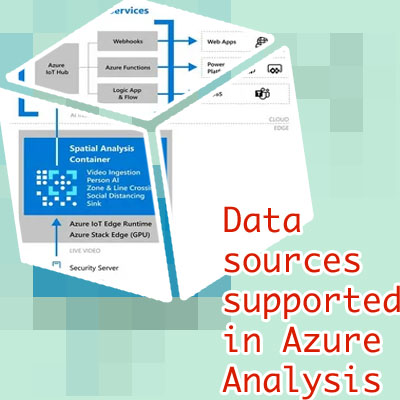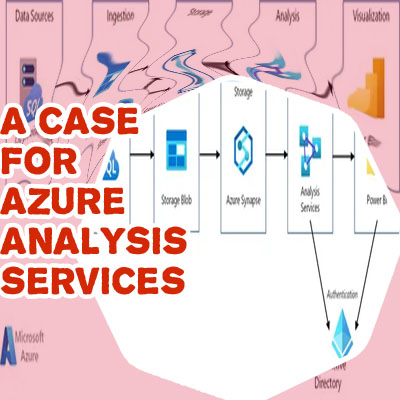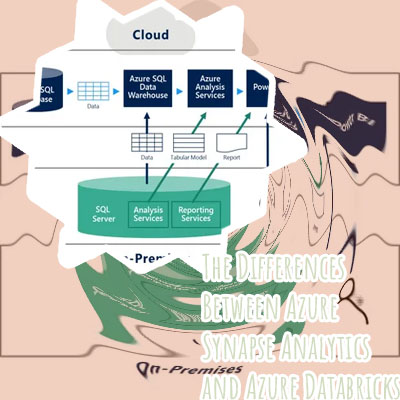
Azure servicesOverview of Azure servicesAzure services, developed by Microsoft, are a comprehensive suite of cloud computing solutions designed to help businesses manage and scale their operations with ease. From infrastructure management to advanced analytics, Azure provides a range of services that cater to diverse business needs. With a global network of data centers, robust security measures, and a focus on innovation, azure analysis services has established itself as a leader in the cloud computing market. This review will explore the key features, benefits, and use cases of Azure services, providing insights into why it has become a go-to choice for organizations worldwide. 
Key features of Azure servicesAzure offers a wide array of services that cover various aspects of cloud computing, including computing, networking, storage, and artificial intelligence. Some of the key features include:

Benefits of using Azure servicesAzure services offer numerous benefits that make it a preferred choice for businesses of all sizes. These benefits include: Scalability and flexibilityOne of the standout features of Azure is its scalability. Businesses can easily scale their resources up or down based on demand, ensuring they only pay for what they use. This flexibility is particularly valuable for companies experiencing rapid growth or fluctuating workloads. Whether it's scaling virtual machines, databases, or storage, Azure makes it simple to adjust resources to meet business needs. Global reach and availabilityAzure operates a global network of data centers, providing businesses with the ability to deploy applications and services closer to their customers. This reduces latency and improves the user experience. With data centers in over 60 regions worldwide, Azure offers one of the most extensive cloud footprints, making it an ideal choice for organizations with a global presence. Robust security and complianceSecurity is a top priority for Azure, and Microsoft invests heavily in ensuring the platform meets stringent security standards. Azure provides advanced security features such as identity and access management, threat detection, and data encryption. Additionally, Azure complies with a wide range of industry standards and regulations, including GDPR, HIPAA, and ISO 27001, making it a trusted choice for businesses in regulated industries. Cost efficiencyAzure offers a pay-as-you-go pricing model, allowing businesses to control costs effectively. By only paying for the resources they use, companies can optimize their spending and avoid unnecessary expenses. Azure also provides cost management tools that help organizations monitor and manage their cloud spending, ensuring they stay within budget. 
Integration with Microsoft productsAs a Microsoft product, Azure integrates seamlessly with other Microsoft services, such as Office 365, Dynamics 365, and Power BI. This integration provides a unified experience for businesses that rely on Microsoft tools, enabling them to leverage their existing investments and enhance productivity. Innovation and continuous improvementMicrosoft continuously invests in Azure, adding new features and services to keep up with the evolving needs of businesses. This commitment to innovation ensures that Azure remains at the forefront of cloud technology, offering customers access to the latest advancements in AI, machine learning, and other cutting-edge fields. Use cases of Azure servicesAzure services are used across a wide range of industries and applications. Here are some common use cases: Application development and hostingAzure provides a comprehensive platform for developing, testing, and hosting applications. With support for various programming languages and frameworks, developers can build web, mobile, and API applications using their preferred tools. Azure App Services and Azure Functions enable rapid deployment and scaling, making it easier for businesses to bring their applications to market quickly. 
Data analytics and business intelligenceAzure offers powerful data analytics and business intelligence tools that help organizations gain insights from their data. Services like Azure Synapse Analytics, Azure Data Lake, and Power BI allow businesses to collect, process, and visualize large volumes of data, driving informed decision-making. These tools support a wide range of analytics scenarios, from real-time data processing to advanced machine learning models. Disaster recovery and backupAzure provides robust disaster recovery and backup solutions that help businesses protect their data and ensure business continuity. Azure Site Recovery allows organizations to replicate their on-premises servers to Azure, providing a seamless failover solution in case of a disaster. Additionally, Azure Backup offers secure, scalable, and cost-effective backup options for critical data, reducing the risk of data loss. Internet of Things (IoT)Azure IoT services enable businesses to connect, monitor, and manage IoT devices at scale. Azure IoT Hub, Azure Digital Twins, and Azure IoT Central provide the tools needed to build IoT solutions that drive operational efficiency and innovation. These services support a wide range of IoT applications, from smart cities to industrial automation. AI and machine learningAzures AI and machine learning services empower businesses to build intelligent applications that can analyze data, recognize patterns, and make predictions. Azure Machine Learning provides a comprehensive platform for developing, training, and deploying models, while Cognitive Services offer pre-built APIs for tasks such as natural language processing, computer vision, and speech recognition. 
Azure services and competitive landscapeAzure faces competition from other major cloud providers, including Amazon Web Services (AWS) and Google Cloud Platform (GCP). While all three offer similar core services, Azure stands out in several key areas:
Getting started with Azure servicesFor businesses looking to get started with Azure, the process is straightforward. Microsoft offers a range of resources, including tutorials, documentation, and support to help new users onboard quickly. Azure also provides a free tier with limited access to its services, allowing businesses to experiment and explore the platform without financial commitment. 
To begin, businesses can sign up for an Azure account and explore the Azure portal, which serves as the central hub for managing resources. From there, users can deploy virtual machines, set up databases, or build applications using Azures extensive suite of tools. Azures pay-as-you-go pricing ensures that businesses can scale their usage as needed, starting small and growing their resources over time. Challenges and considerationsWhile Azure services offer numerous benefits, there are some challenges and considerations to keep in mind:

Why Azure services are worth checking outIf you’re diving into the world of cloud computing, Azure services should definitely be on your radar. Microsofts cloud platform is packed with features that make it easy for businesses to scale, innovate, and stay secure—all without breaking the bank. Whether you’re running a small app or managing an enterprise-level operation, Azures got something for everyone. Top features you’ll loveAzure offers an impressive lineup of services, but there are a few that really stand out. For starters, the Virtual Machines let you spin up servers in minutes, with customizable options that fit just about any workload. Then there’s Azure DevOps, a dream come true for developers looking to streamline their workflows with CI/CD pipelines and agile project management tools. Don’t forget about Azure AI and Machine Learning—perfect if you’re into building smart apps that can predict, analyze, and learn. The best part? It’s all fully managed, so you can focus more on innovation and less on infrastructure headaches. 
Benefits that make a differenceWhy go with Azure? For one, the scalability is a game-changer. You can scale resources up or down based on what you need at the moment, which means you’re not paying for unused capacity. Plus, Azures global network of data centers ensures your apps and services run smoothly, no matter where your users are located. Security is another big plus. With features like multi-factor authentication and advanced threat protection, Azure helps keep your data safe and compliant with all the major industry standards. And if you’re already in the Microsoft ecosystem, the seamless integration with tools like Office 365 and Power BI is a huge time-saver. Getting started with Azure servicesJumping into Azure is easier than you might think. Microsoft offers plenty of resources to help newbies get up to speed, including free tiers and extensive documentation. Whether you’re launching a simple website or a complex AI model, Azure services provide the flexibility and support to get you going quickly. Why Azure services are great for .NET developersAs a .NET developer, I’ve had a great experience using Azure services for various projects. The platform offers a wide range of tools that integrate seamlessly with .NET applications, making development faster and more efficient. Here are some of the key benefits: Seamless integration with .NET

Efficient development and deployment
Scalability and reliability
Overall, Azure services provide a comprehensive set of tools that enhance the .NET development experience. From easy integration and deployment to reliable scaling and management, it’s a platform that supports developers at every stage of their project. 
User review: Leslie Schreiber, 32 y.o., WilliamsportSwitching to Azure services was one of the best decisions we made for our company! The ease of integration with our existing .NET applications saved us so much time, and the scalability is just incredible. I especially love how reliable the platform is—no more late nights worrying about server downtime. It’s been a game-changer for our entire team, and I’m genuinely impressed with how much smoother everything runs now! Igaming industry sports mobile applicationsBest game top web development companyIgaming products software programming companyGame websites development companiesApp casino gambling software providersApp casino development companyUnity game engine gamesIGaming payment gateway developmentMobile game software development blogCash casino software nearshoringMobile game development servicesApp casino services for web developmentGambling payment solutionsBest gambling software developing companiesCash casino software development studioMobile game development websites
|
